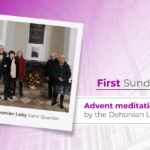November 27 – On Vigilance
De die autem et hora nemo scit, neque angeli cœlorum, nisi solus Pater; sicut autem in diebus Noe, ita erit et adventus Filii hominis; sicut enim erant comedentes et bibentes… Vigilate ergo quia nescitis qua hora Dominus vester venturus sit (Mt 24:36-38, 42).
No one knows the day or the hour, not even the angels, but God alone; as it was in the time of Noah, so will it be at the coming of the Son of Man. The men of that time were eating and drinking without a care… Therefore, keep watch, for you do not know the hour when your Lord will come (Mt 24:36-38, 42).
First Prelude. Our Lord himself concludes his discourse with an exhortation to vigilance.
Second Prelude. Lord, grant that I do not deserve the reproach of not having been able to keep watch with you for one hour.
FIRST POINT: We must keep watch to imitate Our Lord and follow his advice. – Our Lord, after exhorting us to filial fear and trust, also recommends vigilance to us. It is the goodness of his Heart that urges him. He does it for our interest and out of love for us, but also for the glory of his Father.
Has he not given us the example of the most assiduous vigilance? When the devil came to present his temptations to him in the desert, what was he doing? He was keeping watch and praying. Thus, he only had to repeat to the devil some of the thoughts he had meditated on: “It is written: Man does not live by bread alone…” – “It is also written: You shall not put the Lord your God to the test.” – “It is written: You shall worship the Lord your God, and serve him only” [cf. Mt 4:6-25].
This is how we will always have a ready answer for the tempter if we are accustomed to vigilance and prayer.
Do the Gospels not tell us how habitual vigilance and prayer were for Our Lord? “He went off to a deserted place and was praying there” (Mk 1:35). “He withdrew to a mountain and continued his prayer throughout the night” (cf. Mt 14:23, Lk 6:12).
David’s vigilance foreshadowed that of the Savior: “I have watched,” said the psalmist, “and I was alone like a sparrow” (cf. Ps 102:8). In the Garden of Agony, in the supreme struggle against the weaknesses of human nature, was it not to vigilance that he looked for victory? He watched and prayed perseveringly, through all the anxieties and trials of fear and dread, and he found in this vigilance his strength and his consolation. From it, he drew the courageous resolution to go forward to death for our salvation.
In that same circumstance, was it not vigilance that he recommended to his apostles, as the means for them to escape temptation and discouragement? “Watch and pray,” he told them, “that you may not yield to temptation.” He reproached them for not persevering in vigilance and prayer: “Could you not,” he said, “watch with me for one hour?” [cf. 26:40 ff.] – Vigilance was the habitual disposition of the Heart of Jesus.
We must, therefore, keep watch, and keep watch with Jesus.
He also recommended it through various parables. Through that of the head of the house who is on guard against thieves… Through that of the wise and foolish virgins, where salvation is the reward of vigilance.
SECOND POINT: We must keep watch to please Our Lord and save our soul. – Let us therefore keep watch to please Our Lord, to gladden his Heart, to remember him who is our friend, to serve him faithfully and delicately.
Let us watch to save our soul, which Our Lord cares so much about. Let us watch, if we love Our Lord, to preserve his presence in our soul and our union with his divine Heart! Is his grace, his friendship, not the most precious of treasures?
Is it not strange that men are so zealous and vigilant for their temporal interests, to satisfy their avarice or ambition, and that they are so little so in acquiring and preserving the most precious of treasures: grace, the friendship of Our Lord, his presence in their soul?
Watch because you are surrounded by perils: perils from the devil, perils from creatures, perils from your passions.
Listen to Saint Peter, who had known the serious consequences of a lack of vigilance. “My brothers,” he said, “be sober and watch, because your enemy, the devil, prowls like a lion seeking to devour you. Resist him by remaining firm in faith (and in charity)” (cf. 1 P 5:8-9).
THIRD POINT: How we must watch. – Practically, how shall we keep watch? – We will not fall asleep on any of our duties. We will not forgive ourselves for losing a single moment of our time. Our vigilance will extend to our thoughts, our feelings, our words, our actions.
Let us become vigilant like King David, who could say: “My God, I watch from the first moment of the day to think of you, I long for you, my soul burns with an ardent thirst for you, my very senses are under the impression of your presence” (cf. Ps 63:2). And again: “I even forget to eat my bread, to think of you, I watch during the night to meditate on your greatness and say your praises” (cf. Ps 102:5).
But also, to what virtue did this holy king rise through his vigilance! Let us ask for this virtue like him, since we feel it is lacking in us: “My soul has fallen asleep in lukewarmness, strengthen me, Lord, by your words” (cf. Ps 119:28).
“I sleep, but my heart is awake,” says the Bride of the Song [cf. Sg 5:2], meaning that even amidst common occupations—rest, work, mealtime—I keep the impression of God’s presence.
“The wise man gives his heart to vigilance from the morning” (Sirach 39:6). We must dedicate ourselves, attach ourselves to vigilance through thought and through the heart.
Resolutions. – To watch from the morning. To watch and pray. To watch over one’s thoughts, words, and actions. – “Watch,” says Saint Augustine, “by faith, by the heart, by works” (De verbo Dei). – Let us watch as friends, as disciples of the Heart of Jesus.
Colloquy with Jesus recommending vigilance.





